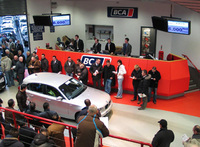December used car values climb as weather disrupts supply line

BCA’s latest Pulse report shows that average used car values rose in December in a short month for trading that was also very short of stock. With only three full weeks of trading and business trailing off in the final week before Christmas, entered and sold volumes fell sharply as the markets wound up for the Christmas break and the weather took its toll.
As a result, average values climbed as professional buyers competed strongly to secure stock for the New Year and beat the anticipated January price rises. The average used car value at BCA in December rose by £113 to £5,905 from the £5,792 recorded in November (and October). Performance against CAP Clean improved by over a point to 97.4% from 96.3% the previous month. Year-on-year, values are £283 behind December 2009, a fall of 4.7%. Values remain well ahead compared to December two years ago, however, with £1,042 separating the two figures.
The heavy snowfall was a critical factor in the month, however, which proved logistically challenging for buyers and sellers alike. While additional levels of business were transacted over web-based remarketing channels, many de-fleet collections had to be deferred as a result of the snow and stock levels fell sharply as a result. Even when vehicles were in situ and able to be sold, there were often logistical issues in getting vehicles delivered to the buyers. Retail used car business was also affected, as motorists simply could not get out to buy – this in turn depressed part-exchange volumes coming back into the system.
BCA’s Communications Director Tony Gannon commented “December often sees a surge in prices as professional dealers acquire stock in readiness for the New Year and 2010 was no exception. However, the weather influence was a significant factor as it left remarketing centres very short of stock – on top of the traditional seasonal slow down and reduced trading period.”
He added “The end result was that supplies of fleet/lease, part-exchange and nearly new cars were well down on November, and this combined with a changing mix of higher value cars offered in special sale sections resulted in average prices rising across the board and for the first time since September.”
Fleet values increased by £120 (1.7%) to £7,235 – reversing two consecutive monthly falls that had seen values decline by around £600 in an eight-week period. Year on year values are ahead by £210, equivalent to a 3% rise, with fleet cars averaging 96.72% of CAP Clean in December.
The combination of short supply and decent demand also buoyed values in the part-exchange sector, which climbed for the second month running from £2,648 in November to £2,705 in December – the joint highest value recorded last year (with March) and the second highest value on record (only bettered by the September 2009 figure of £2,762). Despite this, performance against CAP was largely static at 93.4%.
The increase in nearly new values represented some strong demand for the limited numbers of vehicles available, plus a change in model mix due to some special pre-Christmas sales featuring high value prestige stock. Average values climbed from £18,204 to £21,691, with CAP performance rising sharply from 102% to nearly 107%.
Gannon commented “The most significant factor affecting December was, of course, the weather. In past years, the snow and attendant travel chaos would have caused even more serious disruption to the remarketing sector, simply because the industry remained largely reliant on trade buyers being physically in the same location as the vehicles they were buying. Nowadays, the effect is heavily mitigated by the availability of internet bidding and BCA saw online buyer volumes rise sharply from a typical 18% of sold vehicles to average over 23% nationwide. However, the markets are not immune to the severe weather and there is little doubt that retail businesses were affected in the short term and that impacted on the wholesale markets in turn.”
Gannon added “January generally brings a further uplift in activity, and this is typically sustained until the Easter period – which usually represents a watershed in demand. The months immediately ahead are unlikely to see any significant increase in available volumes, which means average values should remain relatively stable in the short term.”
Gannon warned however “The economy is best described as fragile and we will be seeing the early ffects of the VAT increase alongside continuing rising fuel costs, which means most families will have a little less flexibility in their budgets than last year. It’s not the kind of environment that is likely to generate much growth in big ticket sales, so we shouldn’t expect to see any major peaks in used car demand during the first quarter at least.”

